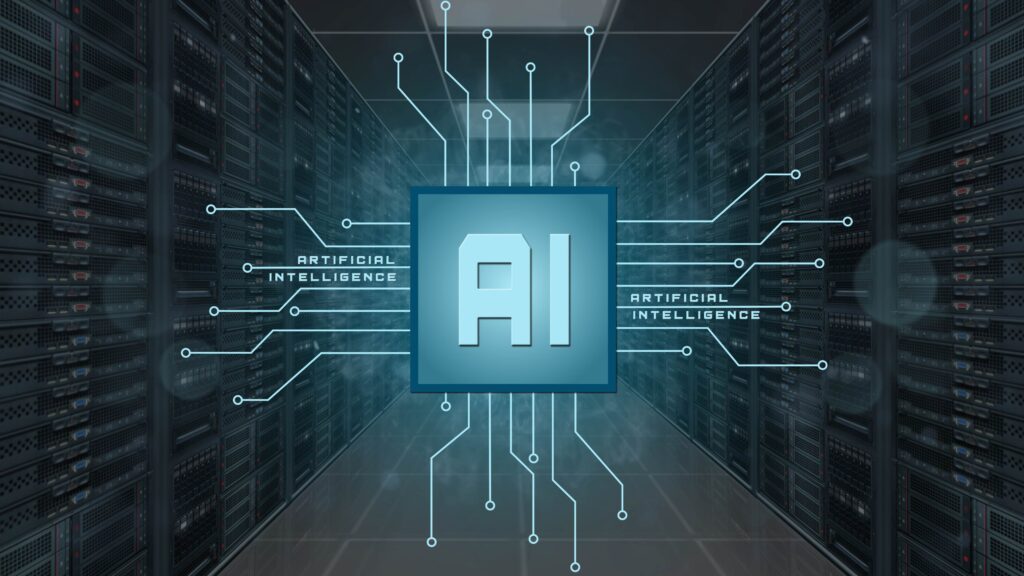With ever-increasing demands on data center infrastructure, robust systems to optimize operations are required. Artificial intelligence offers data center managers innovative solutions to maximize efficiency. By harnessing machine learning algorithms, companies like NTT Ltd implement predictive maintenance to reduce downtime. Meanwhile, STT GDC Pte Ltd uses AI to adjust cooling to lower energy consumption. Adopting smart data center management leverages automation for enhanced security monitoring. Overall, AI empowers operators to boost reliability and cut costs. This technology marks a pivotal advancement in sustainable, resilient data centers. Implementing AI delivers actionable insights to streamline processes. As demands intensify, data center infrastructure requires intelligent systems. AI-driven solutions offer data center managers the next frontier in optimization.
The Role of AI in Data Centre Management
Data centers have adopted AI technology to optimize infrastructure efficiency and reduce operating costs. AI applications assist with predictive maintenance, energy management, and security measures.
Predictive Maintenance
- AI monitors data center infrastructure in real-time and analyses operating parameters to predict potential failures before they occur. AI systems track metrics like server CPU utilization, hard disk temperatures, and network bandwidth usage. When thresholds are exceeded, the AI triggers an alert so technicians can perform preventive maintenance. This proactive approach reduces downtime and ensures high availability.
Energy Management
- AI controls data center cooling infrastructure for optimal energy efficiency. AI systems adjust variables like chilled water temperatures, fan speeds, and vent positions based on server workloads. AI can also shift workloads between servers to balance energy consumption. These techniques decrease power usage and lower utility bills.
Enhanced Security
- AI monitors data center networks and servers for suspicious activity that could indicate a security breach. AI systems analyze event logs, network traffic, and user login patterns to detect anomalies. When the AI spots potential intrusions or malware, it alerts data center security teams so they can investigate and mitigate threats before damage occurs. AI also uses facial recognition to control physical access to data center facilities.
In conclusion, AI and automation are transforming data center operations. AI-based solutions are driving improvements in infrastructure management, cost savings, reliability, and safety. As AI continues to advance, data centers can operate more efficiently without sacrificing performance or availability. With AI, the modern data center is smarter, greener, and more secure.
Key Applications of AI in Data Centres

Predictive Maintenance
- AI can analyze data from sensors and equipment to detect anomalies and predict potential failures before they occur. This allows data centers to schedule preventative maintenance and repairs in advance, minimizing downtime and ensuring high availability. For example, AI may detect that a server fan is operating at a higher-than-normal temperature, indicating it is at risk of failing soon. The data center can then replace the fan during a scheduled maintenance window to avoid an unplanned outage.
Energy Management
- By applying AI to analyze energy usage data in data centers, inefficiencies can be identified and optimized to reduce overall energy consumption. AI systems can adjust cooling levels based on server workloads and occupancy, as well as control server power states. For instance, if an AI system detects that server utilization is low during evening hours, it may power down some servers to save energy. When workloads increase again in the morning, the system will power the servers back on. These types of predictive power management techniques can significantly improve the energy efficiency of data centers.
Enhanced Security
- AI has the potential to strengthen data center security through techniques like behavioral analysis, which examines user activity patterns to detect anomalies that could indicate a security threat. AI can also automatically review security logs and footage to identify any unauthorized access attempts or other suspicious events. Some systems use machine learning to establish a baseline of normal network activity and then flag any deviations from the baseline for investigation. AI-based security tools provide 24/7 monitoring and can detect threats that human security teams may miss, adding an extra layer of protection for data centers.
With the help of AI, data centers are able to cut costs, minimize downtime, and strengthen security through data-driven insights and automation. As AI continues to advance, its applications in data center management are likely to expand, providing even greater operational and efficiency benefits.
Improving Efficiency Through AI-Powered Analytics
AI and machine learning enable data center operators to gain valuable insights into their operations. By analyzing massive amounts of data from sensors and equipment, AI applications can detect inefficiencies and opportunities for improvement.
Predictive Maintenance
- AI systems can analyze data from sensors and equipment to predict when components are likely to fail. This allows operators to perform maintenance at optimal times, reducing downtime and costs. AI may detect anomalies in vibration, temperature, or performance that indicate a component needs replacement before it fails. By leveraging predictive maintenance, operators can shift from reactive to proactive servicing of infrastructure.
Energy Management
- AI also enhances data center energy management. Machine learning algorithms can optimize cooling and power systems based on current compute loads, environmental conditions, and energy prices. AI may adjust temperatures, fan speeds, or workload distribution to minimize power usage while ensuring reliable operations. According to research by the U.S. Department of Energy, AI-based energy management could reduce data center energy usage by up to 20 percent.
Enhanced Security
- AI strengthens data center security through automated monitoring and threat detection. AI systems can analyze security logs, network activity, and user behavior to identify anomalies that may indicate cyber threats. AI can detect known attack patterns as well as new threats. By using AI for security monitoring, data centers can respond faster to intrusions and gain visibility into emerging risks. AI may also be used to automatically patch vulnerabilities, further hardening defenses.
In summary, AI and machine learning are transforming data center operations. AI-powered analytics enable predictive maintenance, optimized energy usage, and enhanced security. By leveraging AI, data center operators can cut costs, improve infrastructure reliability, and better safeguard against cyber threats. AI will be crucial for data centers to meet increasing demands for computing resources in a sustainable and secure manner.
Enhancing Reliability With Predictive Maintenance
Identifying Faults Before Failure
- Predictive maintenance uses AI and machine learning algorithms to monitor data center infrastructure in real-time. By analyzing metrics like temperature, humidity, and equipment performance, the AI can identify anomalies that indicate impending faults or failures. Operators receive alerts about issues like overheating servers or malfunctioning cooling units before they cause outages or damage equipment. With early warnings, data center staff have time to perform maintenance and repairs proactively, enhancing the overall reliability of operations.
Optimizing Maintenance Schedules
- Rather than following arbitrary or overly frequent maintenance schedules, predictive maintenance uses actual operating data to determine optimal service intervals for equipment. The AI monitors performance metrics over time to calculate the mean time between failures for components like servers, storage drives, and network switches. Staff can then schedule maintenance at the ideal point before predicted failures, maximizing uptime while avoiding unnecessary service calls. This data-driven approach to scheduling reduces maintenance costs and improves reliability.
Improving Long-Term Planning
- By identifying trends in equipment faults, degradation, and lifespans, predictive maintenance helps data center operators with long-term planning. The AI can calculate failure rates and life expectancies for infrastructure, helping to determine optimal replacement cycles. Operators gain insight into which components are most prone to issues so they can invest in higher-quality or more resilient replacements. They can also use predictive data to more accurately budget for future maintenance, repair, and replacement costs. This ability to foresee infrastructure needs 6-12 months or more in advance supports maximum uptime and reliability over the long run.
In summary, predictive maintenance leverages AI to provide data center operators with actionable insights into the health and performance of their infrastructure. With an accurate view of current and impending issues, operators can optimize maintenance, improve reliability, cut costs, and better plan for the future. By preventing faults before they happen, predictive maintenance is a powerful tool for maximizing uptime and efficiency.
AI-Driven Data Centre Security
To optimize data center security, companies are implementing AI technologies like machine learning algorithms and predictive analytics. These AI applications can detect malicious network activity and cyber threats faster and more accurately than human security analysts alone.
Anomaly Detection
- AI systems can establish a baseline of normal network activity and user behavior, and then automatically detect anomalies that could indicate cyber threats. For example, an AI may flag unusual login attempts from new devices or locations as potential account compromise attempts. AI is also adept at identifying anomalies in massive amounts of data that humans could not process manually.
Threat Intelligence
- AI systems stay up-to-date with the latest cyber threats by analyzing huge volumes of data from multiple sources. They can then correlate this information to uncover connections between threats, identify threat actors, and anticipate new attack methods. With this intelligence, AI security systems can better detect and mitigate both known and emerging threats.
Predictive Maintenance
- AI applications can analyze data from sensors and logs to predict when critical data center infrastructure components like servers or network switches may fail. This allows for proactive maintenance and part replacements before failures occur, reducing downtime and ensuring high availability. Predictive maintenance enabled by AI also lowers costs compared to routine maintenance schedules.
To summarise, data centers are embracing AI technologies to strengthen their security posture, gain valuable threat intelligence, and enable predictive maintenance. By leveraging machine learning and analytics, AI systems can operate at a scale and level of accuracy that maximizes data center efficiency and protection. AI is a tool that, when implemented responsibly, allows data centers to do more with less while upholding ethical principles of fairness, accountability, and transparency.
In Short,
AI-driven data center management offers immense potential benefits for tech companies of all sizes. By harnessing the power of AI to optimize data center operations, companies can achieve enhanced efficiency, reliability, and cost savings. However, to fully realize these benefits, companies must invest in developing AI applications and integrating them effectively into existing data center infrastructure. With careful planning and execution, AI-driven data centers can become the new normal, allowing companies to get the most out of these mission-critical facilities. Consider your own data center strategy and roadmap, and evaluate where AI could drive step-changes in capability. The future for AI in the data center looks bright.
More Stories
Alibaba’s $53 Billion AI and Cloud Investment: A Strategic Leap into the Future
As technology rapidly evolves, Alibaba’s $53 billion investment in AI and cloud computing deserves your full attention. This strategic move puts the Chinese e-commerce giant at the leading edge of a technological revolution.
PAL e-Wallet: Philippine Airlines’ Digital Leap into Seamless Travel Payments
Philippine Airlines (PAL) has taken a significant step forward with the launch of its PAL e-Wallet. This innovative digital platform represents a leap into the future of seamless travel payments, designed to enhance your journey from booking to boarding.
Avatars Ascend: YouTube’s Virtual Influencers Redefine Digital Fame
In the ever-evolving landscape of digital media, a new phenomenon is reshaping the concept of online celebrity. Virtual influencers, AI-generated or digitally animated personas, are rapidly ascending the ranks of YouTube stardom.
CrowdStrike Elevates Cloud Defense with Real-Time AWS IAM Identity Center Threat Detection
As you navigate the complex landscape of cloud security, staying ahead of evolving threats is paramount. CrowdStrike’s latest enhancement to its Falcon Cloud Security platform introduces real-time threat detection for AWS IAM Identity Center, elevating your defense capabilities to new heights.
ASUS AiCloud Bug Exposes Home Networks to Remote Attacks
Are you aware that your home network could be at risk? A recently discovered vulnerability in ASUS AiCloud-enabled routers has sent shockwaves through the cybersecurity community. This critical flaw, identified as CVE-2025-2492, exposes your network to potential remote attacks, allowing unauthorized access to your devices.
Samsung SmartThings Evolves: AI-Powered Automation and Ambient Sensing Redefine the Smart Home Experience
Samsung SmartThings redefines your connected living experience. With the introduction of AI-powered automation and ambient sensing capabilities, SmartThings is elevating home management to unprecedented levels of sophistication and convenience.


